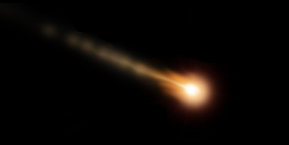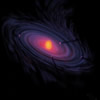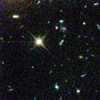
This is probably not going to be quite what you're expecting here. An introduction to meteorites should not mention things like brecciated olivine-bronzite chondrites, LL amphoterites or regmaglypted surfaces. Far too few know much if anything about meteorites as it is, so let's keep this simple.
I'm going to briefly answer the question, "What's so important about meteorites?" Everything else is a subset, at least as I view it.
What makes meteorites important is not that they are among the rarest objects on our planet or that as a result of that fact they are deemed to be valuable by many. In the spirit of brevity, what makes them so special are three things: answers, impacts and perspective.
ANSWERS
 Meteoritics is a fascinating arena, bridging across more scientific disciplines than any other field I'm aware of. We have learned more about the age-old question "Why are we here?" through the study of meteorites than through anything else. Better put, meteorites have provided a literal time capsule which has taken us to the beginnings of our solar system - and perhaps beyond - and provided many answers to the question "How are we here?" The Murchison meteorite alone - containing high levels of carbon, approximately 12% water and 92 amino acids (which are the building blocks of proteins, which are the building blocks of things like DNA, etc.), only 19 of which have ever been identified on Earth - represents a fascinating potential explanation as to how the ingredients for life arrived on our planet. Steady-state theories of days long gone by have also vanished with the understanding that Earth, the solar system, the Milky Way and the universe itself are still "forming." I use quotes here, as the term forming suggests that there is some intentional direction in which our planet, its solar system, the Milky Way and the universe itself is headed. This is clearly not the case, though I won't spend time on the myriad justifications for that statement here. There is no crystalline sphere around our tiny planet, and we are certainly not at the center of the universe, our solar system or anything else, for that matter. The accretion disk is still evolving from what was once a protoplanetary disk of dust and small fragments. We have held samples of this material in our hands and studied them in painstaking detail, and they hold more answers than anyone could possibly have imagined only a few generations ago. The most exciting part here is that there is a great future on the road ahead of uncovering many more unimaginable wonders through meteoritics, and it is the next generation which has the greatest opportunity to make the most significant contributions in history in this realm. To quote Henry David Thoreau, "If one advances confidently in the direction of his dreams, and endeavors to live the life which he has imagined, he will meet with a success unexpected in common hours."
Meteoritics is a fascinating arena, bridging across more scientific disciplines than any other field I'm aware of. We have learned more about the age-old question "Why are we here?" through the study of meteorites than through anything else. Better put, meteorites have provided a literal time capsule which has taken us to the beginnings of our solar system - and perhaps beyond - and provided many answers to the question "How are we here?" The Murchison meteorite alone - containing high levels of carbon, approximately 12% water and 92 amino acids (which are the building blocks of proteins, which are the building blocks of things like DNA, etc.), only 19 of which have ever been identified on Earth - represents a fascinating potential explanation as to how the ingredients for life arrived on our planet. Steady-state theories of days long gone by have also vanished with the understanding that Earth, the solar system, the Milky Way and the universe itself are still "forming." I use quotes here, as the term forming suggests that there is some intentional direction in which our planet, its solar system, the Milky Way and the universe itself is headed. This is clearly not the case, though I won't spend time on the myriad justifications for that statement here. There is no crystalline sphere around our tiny planet, and we are certainly not at the center of the universe, our solar system or anything else, for that matter. The accretion disk is still evolving from what was once a protoplanetary disk of dust and small fragments. We have held samples of this material in our hands and studied them in painstaking detail, and they hold more answers than anyone could possibly have imagined only a few generations ago. The most exciting part here is that there is a great future on the road ahead of uncovering many more unimaginable wonders through meteoritics, and it is the next generation which has the greatest opportunity to make the most significant contributions in history in this realm. To quote Henry David Thoreau, "If one advances confidently in the direction of his dreams, and endeavors to live the life which he has imagined, he will meet with a success unexpected in common hours."
IMPACTS
 Let's return to the point that our planet is still "forming." Obviously, most of the material in our solar system has by now accreted. But major cosmic impacts have scarred our planet since the very beginning and continue to do so, albeit over great vistas of time. There is enough material orbiting the sun between Mars and Jupiter in the asteroid belt - some of it in very large masses - to form another minor planet the size of our moon, and orbits are not unchanging things. A relatively small object, say, 1 kilometer in diameter or even smaller, could potentially wreak all sorts of devastation upon our civilization. While earthquakes, tsunamis, hurricanes, tornados and the like are unpreventable natural disasters, they all pale in comparison in terms of potential damage when compared to a major cosmic impact on the face of our planet. The irony is that a cosmic impact may be the one natural disaster we can actually prevent. The study of meteorites - in combination with unmanned missions we continue to send to asteroids and comets - tells us a great deal about the composition of these potentially catastrophic objects and, therefore, how we might actually intervene to divert an impending impact. Asteroids which orbit near our planet are one part of the matter. Scientists have been working non-stop for some time now in an attempt to identify 90% of all such Near-Earth Objects of a particular size or larger. The good news is twofold: one, the size of objects we are identifying has continued to shrink, and two, we may be aware of an impending impact decades in advance of the event and have plenty of time to formulate a global strategy and respond in time. The bad news is threefold: one, the pace is far too slow given what we now know, two, we're not talking 100% identification and it only takes a single impact, and three, simply put, is comets. Comets, most of which travel on highly-inclined orbits, are for the most part unknown to us until their approaches from far beyond Pluto bring them into view. A comet on a collision course with Earth might not be known at all until a couple of months or maybe even a few weeks prior to impact. This means that our ability to react might have to be measured on a very tight timeline. Again, with the technological foundation and many practical response theories in place, it is the next generation which has the greatest opportunity to make the critical contribution(s) which may literally save the world. To be sure, statistically speaking, we are talking very small odds of this happening any time in the foreseeable future or well beyond. But with the technological advances for the most part already in place and a current capacity to understand and meet the problem head-on, how incredibly stupid we all would feel if in tomorrow's headlines a flying mountain's or iceberg's discovery is announced which could wipe all of us out in a month's time while we simply sit and wait for it, unable to respond in any way. Winston Churchill was often asked why he took speaking notes to the podium but never used them. He responded, "Well, I have fire insurance for my house, but I don't expect it to burn down."
Let's return to the point that our planet is still "forming." Obviously, most of the material in our solar system has by now accreted. But major cosmic impacts have scarred our planet since the very beginning and continue to do so, albeit over great vistas of time. There is enough material orbiting the sun between Mars and Jupiter in the asteroid belt - some of it in very large masses - to form another minor planet the size of our moon, and orbits are not unchanging things. A relatively small object, say, 1 kilometer in diameter or even smaller, could potentially wreak all sorts of devastation upon our civilization. While earthquakes, tsunamis, hurricanes, tornados and the like are unpreventable natural disasters, they all pale in comparison in terms of potential damage when compared to a major cosmic impact on the face of our planet. The irony is that a cosmic impact may be the one natural disaster we can actually prevent. The study of meteorites - in combination with unmanned missions we continue to send to asteroids and comets - tells us a great deal about the composition of these potentially catastrophic objects and, therefore, how we might actually intervene to divert an impending impact. Asteroids which orbit near our planet are one part of the matter. Scientists have been working non-stop for some time now in an attempt to identify 90% of all such Near-Earth Objects of a particular size or larger. The good news is twofold: one, the size of objects we are identifying has continued to shrink, and two, we may be aware of an impending impact decades in advance of the event and have plenty of time to formulate a global strategy and respond in time. The bad news is threefold: one, the pace is far too slow given what we now know, two, we're not talking 100% identification and it only takes a single impact, and three, simply put, is comets. Comets, most of which travel on highly-inclined orbits, are for the most part unknown to us until their approaches from far beyond Pluto bring them into view. A comet on a collision course with Earth might not be known at all until a couple of months or maybe even a few weeks prior to impact. This means that our ability to react might have to be measured on a very tight timeline. Again, with the technological foundation and many practical response theories in place, it is the next generation which has the greatest opportunity to make the critical contribution(s) which may literally save the world. To be sure, statistically speaking, we are talking very small odds of this happening any time in the foreseeable future or well beyond. But with the technological advances for the most part already in place and a current capacity to understand and meet the problem head-on, how incredibly stupid we all would feel if in tomorrow's headlines a flying mountain's or iceberg's discovery is announced which could wipe all of us out in a month's time while we simply sit and wait for it, unable to respond in any way. Winston Churchill was often asked why he took speaking notes to the podium but never used them. He responded, "Well, I have fire insurance for my house, but I don't expect it to burn down."
PERSPECTIVE
 Much on this point has already been covered, but perspective itself, I believe, is incredibly important to the human condition. Having evolved to deal with speeds, timeframes, and issues which unfold in a narrow window, it is a remarkable thing to contemplate the vastness and ancientness and cosmic traveling speeds of all that lies around us on this tiny little planet 25,000 light years from the center of our galaxy of some 200 billion stars, which lies in a 13.765 billion-year-old visible universe of some 100 billion or more similar galaxies. We exist on this planet but for an instant, and to revel in what we perceive to be problems in our small, egocentric worlds seems to me an incredible waste of a wonderful opportunity. Meteorites are a tangible time capsule, a Rosetta stone (pun intended), that provide wonders and perspective to the human mind which only generations ago were impossible to even contemplate. My own personal and numerous experiences in the meteorite world, of which I am proud to be an inconsequential member, have repeatedly and consistently reinforced my own awe of the figurative miracle of simply being here at all. Even more powerful is the reality that we have evolved to the current state of being able to unlock so many answers about our own origin. I, like anyone else, have no idea what wonders may lay ahead, but I do know that Richard Norton summed it up better than I have ever read in so few words in his Introduction to Rocks From Space from 1994: "To hold in your hand something alien, created before Earth existed, is irresistible. Once, while giving a lecture to a group of vacationers on a cruise ship, I casually handed a meteorite to someone in the first row and asked that it be passed around so everyone would have a chance to hold a rock from space older than Earth. The reaction was electric. People clambered to touch it and a riot nearly ensued. The allure of these ancient rocks is universal. They speak in all languages. To hold something older than Earth is to return to creation itself. Some meteorites are examples of the earliest solid bodies, primitive and pristine. They have not changed appreciably in the past 4.5 billion years. Locked within them are clues to the formation and early evolution of the solar system, Earth, and indeed, life itself. Other meteorites show indisputable histories of heating, metamorphism, and recrystallization. These in turn tell of parent bodies, subplanetary masses that must have existed (and perhaps still do) somewhere in the asteroid belt, where no major planet ever formed. As we learn more about the constituents of the solar system, we better understand the interrelationships between the various parts. When Thomas Jefferson was president, scientists of the day considered phenomena such as meteors and fireballs and objects such as asteroids, meteorites, and comets to be completely independent. Only after nearly two hundred years of study can we say with certainty that they are all related, and one cannot be studied effectively without introducing the others." My hope is that more bright, young people in the next generation than in ours will continue to break the chains of myth, and are inspired enough by something like meteorites and meteoritics to ply their energy and intellect in pursuit of truth and the uncovering of yet untold and unknown wonders.
Much on this point has already been covered, but perspective itself, I believe, is incredibly important to the human condition. Having evolved to deal with speeds, timeframes, and issues which unfold in a narrow window, it is a remarkable thing to contemplate the vastness and ancientness and cosmic traveling speeds of all that lies around us on this tiny little planet 25,000 light years from the center of our galaxy of some 200 billion stars, which lies in a 13.765 billion-year-old visible universe of some 100 billion or more similar galaxies. We exist on this planet but for an instant, and to revel in what we perceive to be problems in our small, egocentric worlds seems to me an incredible waste of a wonderful opportunity. Meteorites are a tangible time capsule, a Rosetta stone (pun intended), that provide wonders and perspective to the human mind which only generations ago were impossible to even contemplate. My own personal and numerous experiences in the meteorite world, of which I am proud to be an inconsequential member, have repeatedly and consistently reinforced my own awe of the figurative miracle of simply being here at all. Even more powerful is the reality that we have evolved to the current state of being able to unlock so many answers about our own origin. I, like anyone else, have no idea what wonders may lay ahead, but I do know that Richard Norton summed it up better than I have ever read in so few words in his Introduction to Rocks From Space from 1994: "To hold in your hand something alien, created before Earth existed, is irresistible. Once, while giving a lecture to a group of vacationers on a cruise ship, I casually handed a meteorite to someone in the first row and asked that it be passed around so everyone would have a chance to hold a rock from space older than Earth. The reaction was electric. People clambered to touch it and a riot nearly ensued. The allure of these ancient rocks is universal. They speak in all languages. To hold something older than Earth is to return to creation itself. Some meteorites are examples of the earliest solid bodies, primitive and pristine. They have not changed appreciably in the past 4.5 billion years. Locked within them are clues to the formation and early evolution of the solar system, Earth, and indeed, life itself. Other meteorites show indisputable histories of heating, metamorphism, and recrystallization. These in turn tell of parent bodies, subplanetary masses that must have existed (and perhaps still do) somewhere in the asteroid belt, where no major planet ever formed. As we learn more about the constituents of the solar system, we better understand the interrelationships between the various parts. When Thomas Jefferson was president, scientists of the day considered phenomena such as meteors and fireballs and objects such as asteroids, meteorites, and comets to be completely independent. Only after nearly two hundred years of study can we say with certainty that they are all related, and one cannot be studied effectively without introducing the others." My hope is that more bright, young people in the next generation than in ours will continue to break the chains of myth, and are inspired enough by something like meteorites and meteoritics to ply their energy and intellect in pursuit of truth and the uncovering of yet untold and unknown wonders.
Stay tuned for Meteorites 102...
I wrote a more typical version of "Meteorites 101" for the Meteorite Association of Georgia Web site. Our Webmaster, Sean Murray, made the page look so fantastic that it just had to be referenced here!
 About
About Priorities
Priorities Found a meteorite?
Found a meteorite? Logo Merchandise
Logo Merchandise